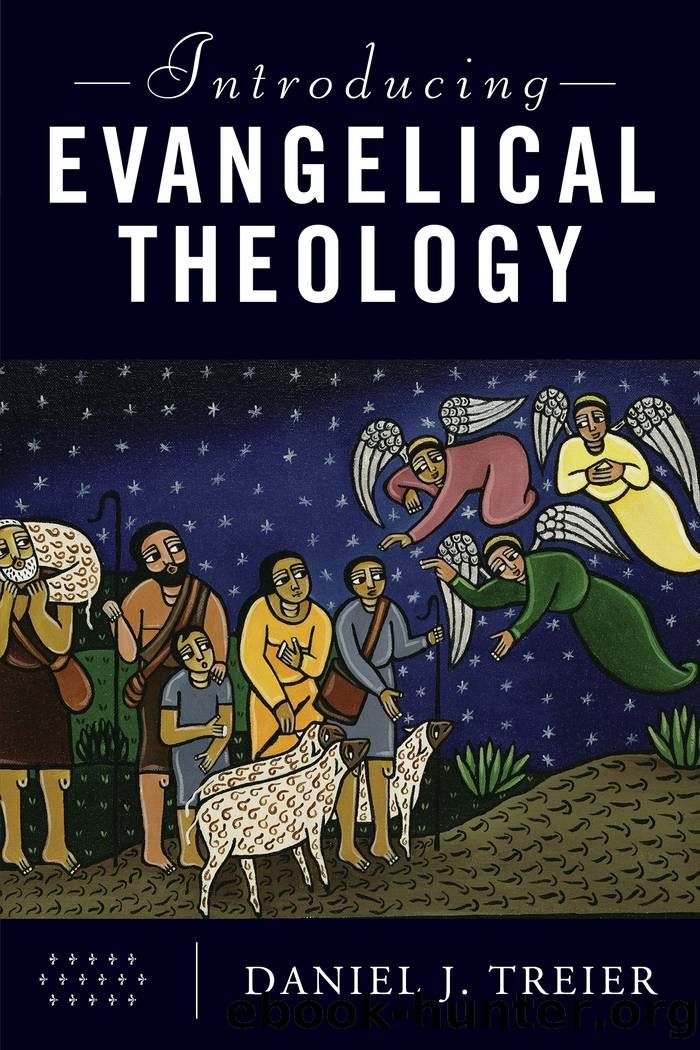Introducing Evangelical Theology by Treier Daniel J.;

Author:Treier, Daniel J.;
Language: eng
Format: epub
Tags: Theology;Evangelicalism;Reformed Church—Doctrines;REL067000
ISBN: 9781493416776
Publisher: Baker Academic
Published: 2019-06-06T00:00:00+00:00
Salvation
As with sin, Christian teaching about salvationâ*soteriologyâinvolves both broad consensus and much variety. *Salvation denotes deliverance from danger or bondage, healing from a deadly illness or wound. As an action of the Triune God, salvation depends upon the Fatherâs loving initiative, the Sonâs ministry of reconciliation, and the Spiritâs application of the Sonâs atoning work. An *ordo salutis, or âorder of salvation,â describes in sequence how the Spirit unites people to Christ. âTo know Christ is to know his benefits,â said Lutherâs sidekick Philipp Melanchthon (1497â1560).19
The corollary truth is vitally important: to know Christâs benefits is to know Christ, or, even more forcefully, knowing Christ is the crucial benefit that defines salvation (e.g., John 17:3; Phil. 3:10â11). *Union with Christ is the central, overarching category in Paulâs theology, naming the covenant relationship in which we receive the benefits of salvation. Numerous prepositions in the New Testament Epistles relate us to Christ: we participate âtogether withâ him in the saving events of his life, so we receive Godâs grace âthroughâ him, we have our identity âinâ him, and we live âforâ him. This union is therefore preeminently a covenant relationship, while this relationship has intimate and mystical aspects. Marriage is the most prominent human analogy, but adoption is another: in union with Christ we become Godâs children, joint heirs of a glorious inheritance that his indwelling Spirit guarantees.20
The Bible may not use enough consistent vocabulary and technical concepts to convey one clear, systematic ordo salutis. Nevertheless, the application of salvation involves a basic series of divine actions and human responses. Godâs actions involve election to redeem humans, which is accomplished by calling them into union with Jesus Christ, so that they may receive justification, which addresses their status (removing sinâs penalty); regeneration, which addresses their habitus (removing sinâs power over them); and glorification, which applies salvation fully (removing sinâs presence entirely). Along the way, regeneration involves baptism with the Holy Spirit and sanctification; humans respond with conversion, consecration, assurance, and perseverance. Those aspects of the Spiritâs application of salvation will be treated later, in chapter 12. The current chapter focuses on how the Spirit unites people to Jesus Christ and what that means for their past, their present, and their future.
Download
This site does not store any files on its server. We only index and link to content provided by other sites. Please contact the content providers to delete copyright contents if any and email us, we'll remove relevant links or contents immediately.
The Lost Art of Listening by Michael P. Nichols(7506)
Why I Am Not A Calvinist by Dr. Peter S. Ruckman(4153)
The Rosicrucians by Christopher McIntosh(3521)
Wicca: a guide for the solitary practitioner by Scott Cunningham(3179)
Signature in the Cell: DNA and the Evidence for Intelligent Design by Stephen C. Meyer(3138)
Real Sex by Lauren F. Winner(3023)
The Holy Spirit by Billy Graham(2953)
To Light a Sacred Flame by Silver RavenWolf(2823)
The End of Faith by Sam Harris(2742)
The Gnostic Gospels by Pagels Elaine(2531)
Waking Up by Sam Harris(2461)
Nine Parts of Desire by Geraldine Brooks(2369)
Jesus by Paul Johnson(2363)
Devil, The by Almond Philip C(2333)
The God delusion by Richard Dawkins(2309)
Heavens on Earth by Michael Shermer(2285)
Kundalini by Gopi Krishna(2185)
Chosen by God by R. C. Sproul(2165)
The Nature of Consciousness by Rupert Spira(2108)
